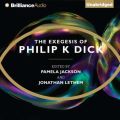 Exegesis
Exegesis
Автор: Группа авторов
Год издания: 0000
 Exegesis of Philip K. Dick
Exegesis of Philip K. Dick
Автор: Philip K. Dick
Год издания:
 Ancient Apologetic Exegesis
Ancient Apologetic Exegesis
Автор: Stuart Parsons
Год издания:
New Testament scholarship uncovers much about first-century Christianity. Early Christian masters such as Origen and Augustine draw great attention to the third and following centuries. Yet oddly, despite this flood of attention to both the first century and to the third and later centuries, the second century often escapes notice, this despite its almost living memory of Jesus and his apostles from only a generation or two prior. A distinctive biblical exegesis was used by those second-century apologists who challenged Greco-Roman pagan religionists. Along with introducing the general shape of this ancient apologetic exegesis, Ancient Apologetic Exegesis aims at its recovery as well. Current literature often misunderstands or dismisses second-century exegetical approaches. But by looking behind anachronistic views of ancient genre, literacy, and rhetoric, we can rediscover a forgotten form of early Christian exegesis.
 Borderline Exegesis
Borderline Exegesis
Автор: Leif E. Vaage
Год издания:
In Borderline Exegesis , Leif Vaage presents an alternative approach to biblical interpretation, or exegesis—an approach that bends the boundaries of the traditional North American methodology to analyze the meaning of biblical texts for a wider audience. To accomplish this, Vaage engages in a practice he calls “borderline exegesis.” Adapting anthropological notions of borderlands, borderline exegesis writes biblical scholarship peripherally, unearthing the Bible’s textual and discursive borderlands and allowing biblical texts to be at play with the utopian imagination. The book’s main chapters comprise four case studies that engage in a “divergent reading” of the book of Job, the Gospel of Matthew, the Epistle of James, and the book of Revelation. Informed by the author’s time in war-torn Peru, these chapters take on themes that the poor and disenfranchised have historically claimed—themes of social justice, the legitimacy (or lack thereof) of prevailing social practices, and, most importantly, utopian demand for another possible world. The chapters are held together by the presentation of a greater theoretical framework that provides reflection on the exegetical practices within and confronts biblical scholars with important questions about the aims of the work they do. Taken as a whole, Borderline Exegesis seeks to disclose what the professional practice of textual interpretation might become if we refuse the conventional distances between academic practice and lived experience.
 Theology, Politics, and Exegesis
Theology, Politics, and Exegesis
Автор: Jeffrey L. Morrow
Год издания:
Modern biblical scholars often view the methods they employ as objective and neutral, tracing the history of modern biblical scholarship to the eighteenth and nineteenth centuries. In this volume, Jeffrey Morrow examines some earlier, lesser known roots of modern biblical scholarship. He explores biblical scholarship from the fourteenth through the seventeenth centuries and then discusses its new place in the Enlightenment of the eighteenth century where such scholarship would flourish. Far from merely an objective and neutral method, such scholarship was never without philosophical, theological, and political underpinnings. Morrow concludes the volume with a look at the separation of biblical studies from theology, using the example of Catholic moral theology in the twentieth century.
 The Art of Exegesis
The Art of Exegesis
Автор: Matthew E. Borrasso
Год издания:
Although he loomed large during his lifetime, Martin Hans Franzmann has faded away in the minds of American Lutherans. Memories of him typically orbit around an appreciation for his hymnody. He was, however, more than a hymn writer. To only understand or appreciate his hymns is to only understand or appreciate a part of him. This book seeks to shine a light on a brilliant and gifted poet of the church by unpacking and analyzing his life and work. In so doing, it is hoped that he will loom large once again. Franzmann's hymns have endured for a reason, namely because he was singularly focused on teaching people to hear the voice of God in the text of the Scriptures.